



Major Number: 462
Major Code: 120503
I. A Brief Introduction to Information Resource Management
As an intangible production factor, information resources plays an irreplaceable role in the economic and social resource structure, and have become the focus of international competition in the context of economic globalization. Information resource management is a science that comprehensively applies theories and methods of social sciences and natural sciences, to study information resources and their value realization laws. It takes information resources and its development, utilization and management phenomena as research objects, and strives to explore the regularity of the realization of information resources and realize its strategic value to economic and social development.
Information Resource Management is a second-level discipline under the first-level discipline of Library Information and Archives Management. Apart from strengthening students in processing and managing traditional literature resources, they are also expected to practice collecting, analyzing and predicting enterprise intelligence, so as to cultivate excellent information resource management talents.
II. Educational Objectives
This major requires students to develops the ability to use modern technology to collect, organize, retrieve, analyze, evaluate and develop information. It aims to cultivating talents to engage in information organization, information resources utilization, and consulting services, such as advanced composite and innovative professionals, in nation institutions, enterprises, and other social organizations.
III. Basic Requirements
Undergraduates are expected:
1. To have good ideological and moral cultivation and a strong sense of social responsibility, teamwork and cooperation; to be self-confident and be able to make independent judgments;
2. To master the basic theories of information resource management and information technology application;
3. To have the ability of information collection, organization, retrieval, analysis, evaluation and utilization;
4. To develop the ability to integrate and manage information resources, and apply existing information services.
4. To be familiar with the development of related fields in this major. To be equipped with certain scientific research and practical ability.
IV. Major Courses
Management, Economics, Information Management, Principles of Database System, Advanced Language Program Design (C), Management Information System, Information Collection, Information Organization, Introduction of Information Retrieval, Practical Technology of Data Analysis,IS Analysis and Design, Information Analysis and Prediction, Metrology of Information, Information Users Research, Information Consulting and Service.
V. Length of Schooling and Degree
Length of Schooling: 4 years
Degree: Bachelor of Management
VI. Distribution of Hours and Credits
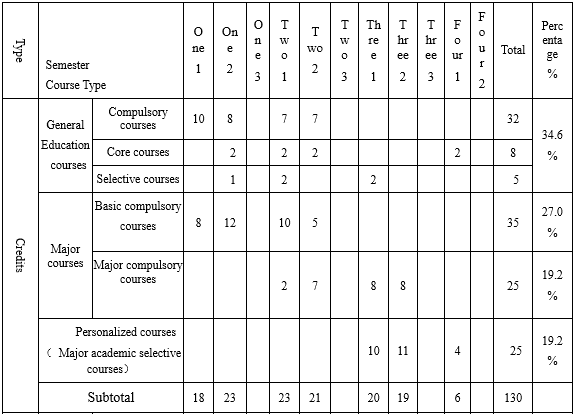
![]()
VII. List of Courses
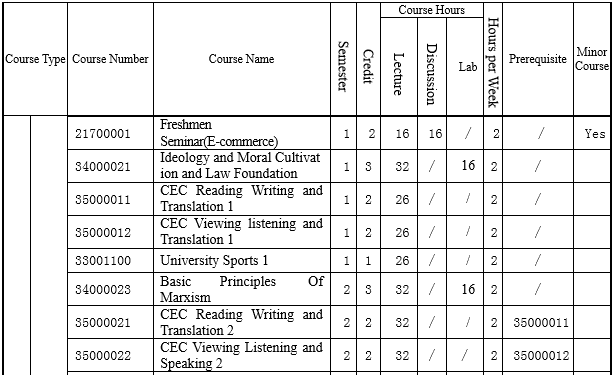
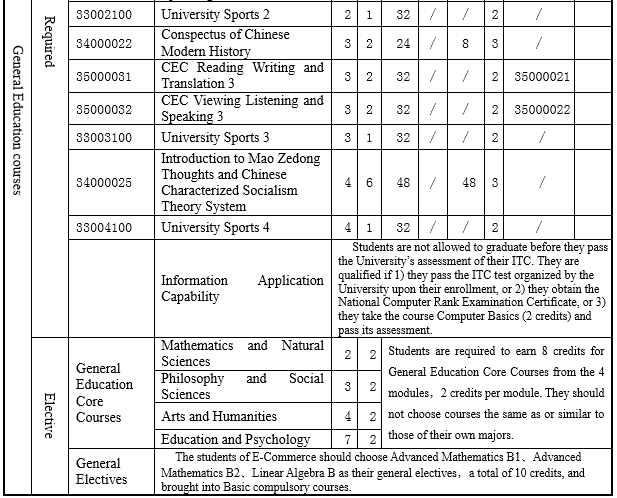
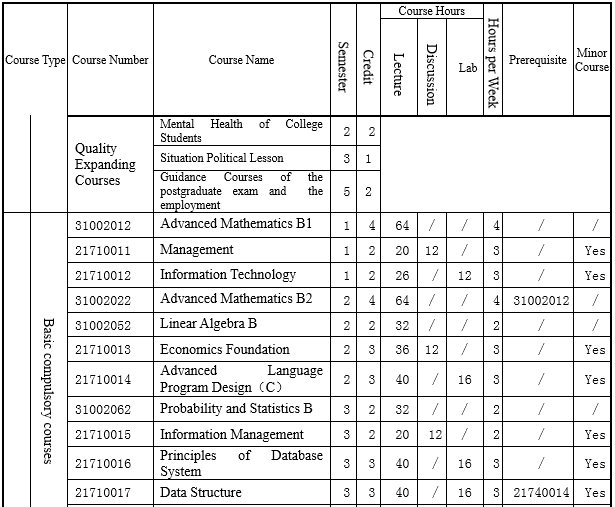
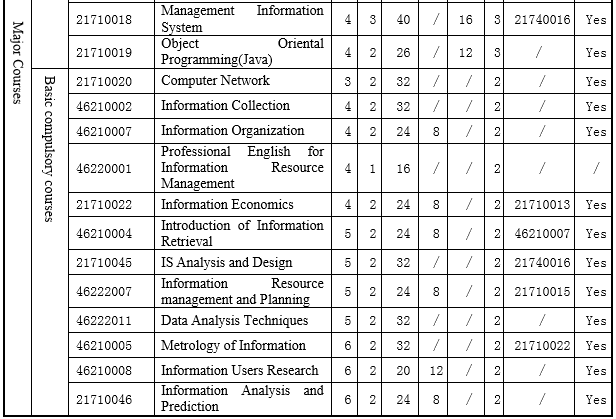
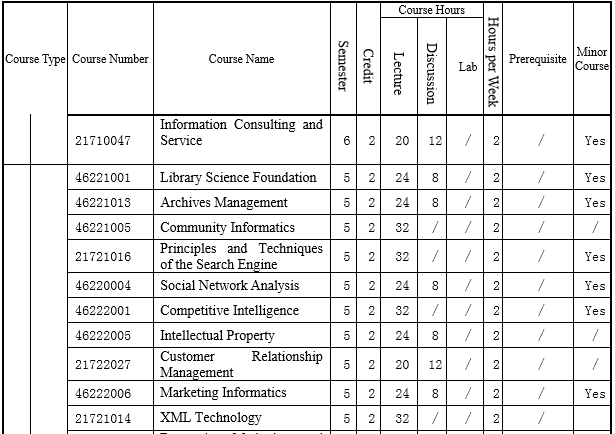
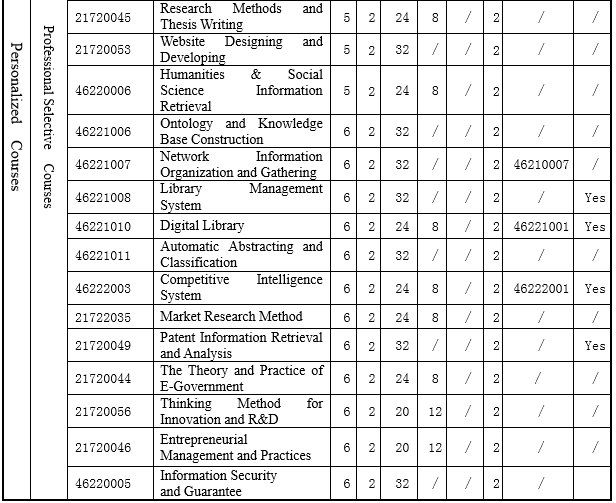
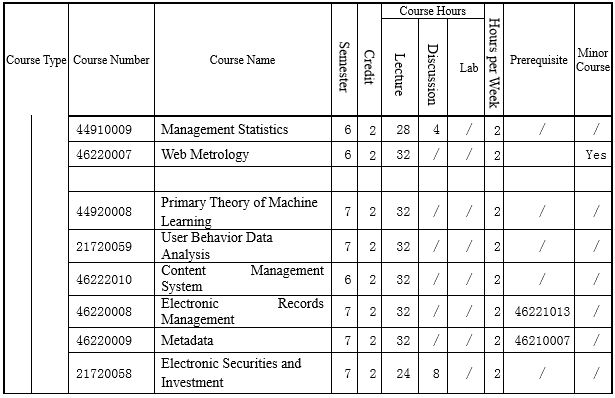
VIII. Practical Education
Practice Details
Undergraduates are required to finish an 8-week educational practice or graduation practice to
gain 8 credits in the 7th or 8th semester; also to finish graduation thesis and pass the defense to gain 6 credits in the 8th semester. Details can be found in the following table:

Community Education
Undergraduates are required to get 4 credits for community practice. The criterion is as follows:

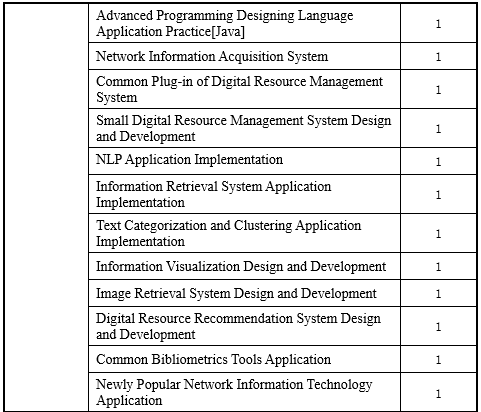
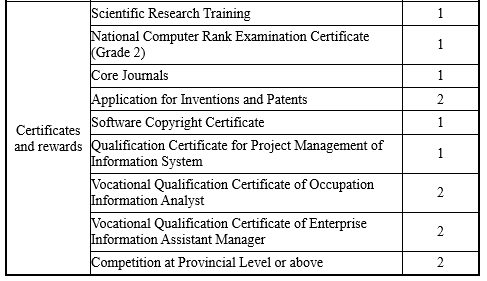
X. Explanations
1. The three majors of School of Information Management (E-commerce,Information Management and Information System, Information Resource Management) are taught identical with E-commerce category directions in the first three semesters. Namely in the first three semesters all the three majors students share the same basic courses. From the fourth semester, classes are varied according to the different majors.
2.This specialty divides into General Education courses,major courses and personalized
courses. Among them, total 45 credits for the General Education courses: 32 credits for compulsory courses, 8 credits for General Education selective courses and 5 credits for quality expanding courses.Total 60 credits for major courses: 35 credits for basic compulsory courses (10 credits for general elective courses) and 25 credits for major compulsory courses.Total 25 credits for personalized courses: that is 25 credits for major academic selective courses.
3.The 10 credits of general elective courses:the E-commerce category majors are required to choose Advanced Mathematics B1,Advanced Mathematics B2, and Linear Algebra B as general selective courses. These total 10 credits are subordinate to major compulsory courses.
4.The 8 credits of the General Education selective courses: students separately choose 2 credits from the following four modules :Math and Science,Philosophy and Social Science,Humanities and Arts and Education and Psychology. In total 8 credits will be gained and the choice of theses courses should not be repetitive or similar to students‟ own major.
5.The requirement of Dual-degree and minor program. The relative courses should be selected from the major courses, 28 credits are required for minor program and 42 credits for dual-degree, also thesis is required.
6. Earning credits for College English. College English is taught based on students’ English proficiency. A total of 12 credits can be earned upon the completion of the College English courses. Based on the results of the English placement test they take when entering CCNU, students will attend Preliminary Class (C-level), Secondary Class (B-level) or Advanced Class (A-level) accordingly. General English courses, with a total of 12 credits, are taught throughout three semesters for students in C-level class. For B-level students, they need to complete both general English courses (2 semesters; 8 credits) and English courses for general knowledge (1 semester; 4 credits). A-level not only includes general English courses (1 semester; 4 credits) and English courses for general knowledge (I semester; 4 credits), but also English courses for specific purpose (1 semester; 4 credits).For more details of earning credits of college English, refer to “Level-based English Teaching Implementing Scheme of CCNU”.(CCNU Administrative File[2015]No.232)
7. Earning credits for University Sports. Students earn credits for University Sports by joining the University‟s sports clubs. They should at least earn 4 credits in four semesters by taking courses offered by sports clubs. Furthermore, they must take the National Standard Test for Students‟ Physical Health 4 times (once every year). For more details, refer to “Notice of Ministry of Education on Issuing „Basic Standards for Physical Education in Colleges and Universities‟”. For more details of earning credits by joining sports clubs, refer to “Implementation Plan for the Reform of CCNU‟s University Sports Courses”. (CCNU Administrative File [2015] No. 246).
8. Assessment of Information Technology Capability (ITC).Students are not allowed to graduate before they pass the University‟s assessment of their ITC. They are qualified if 1) they
pass the ITC test organized by the University upon their enrollment, or 2) they obtain the National Computer Rank Examination Certificate, or 3) they take the course Computer Basics (2 credits) and pass its assessment. Students who pass their ITC assessment in either of the first two ways do not earn extra credits. Those who pass their ITC assessment in the third way earn 2 credits, which can be accepted as credits for Free Elective Courses. Non-free normal students should pay extra fees for earning the credits.
9.Students are expected to take part in an 8-week educational practice or graduation practice organized by college in the 7th or 8th semester(8 credits will be gained after finishing the practice).Students are also required to finish graduation thesis in the 8th semester and pass the defense(6 credits will be gained). Students could join social activities or practical activities in summer or winter vacations.
10.All the qualified students who get all the required credits (130 credits for the courses and 4 for community education), complete all the required level of college English, university sports, ITC etc and pass the thesis defense can get their degree, Bachelor of Management.
Copyright © School Of Information Management
To address:152 luoyu road, hongshan district, wuhan city, hubei province
